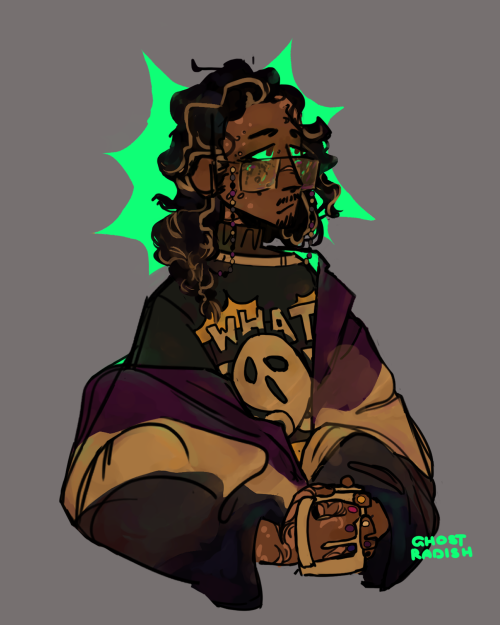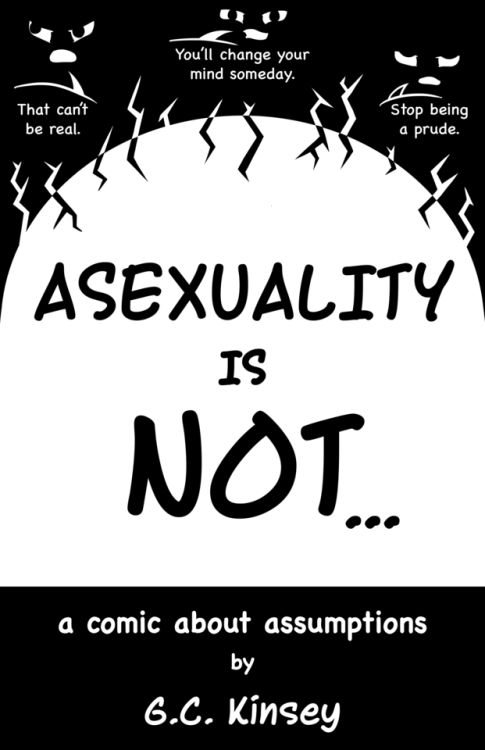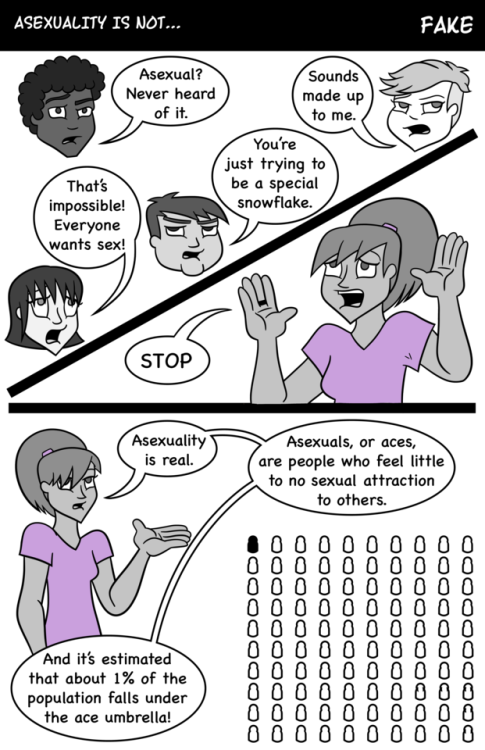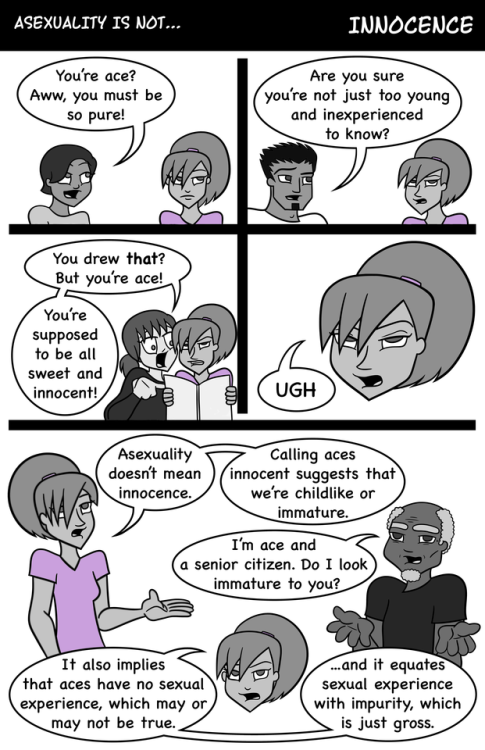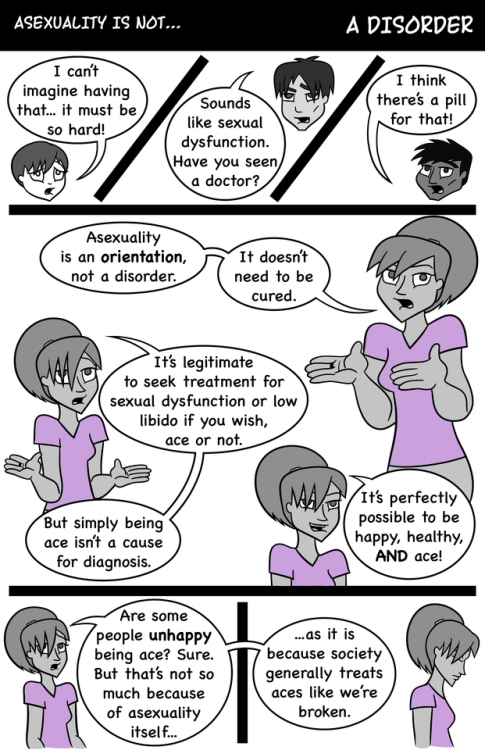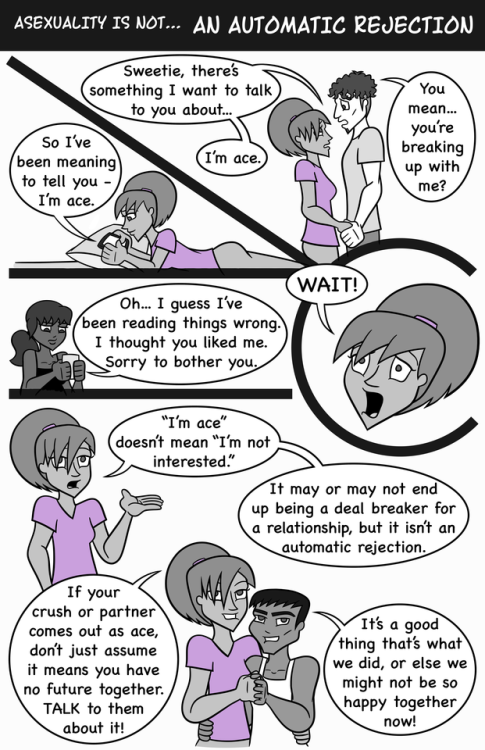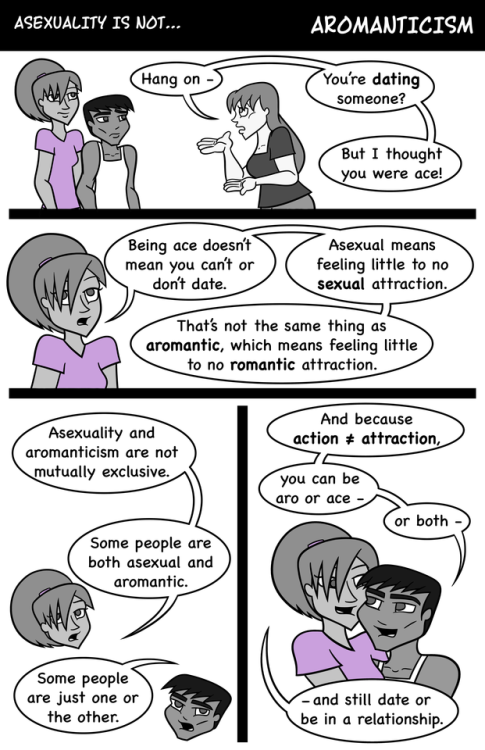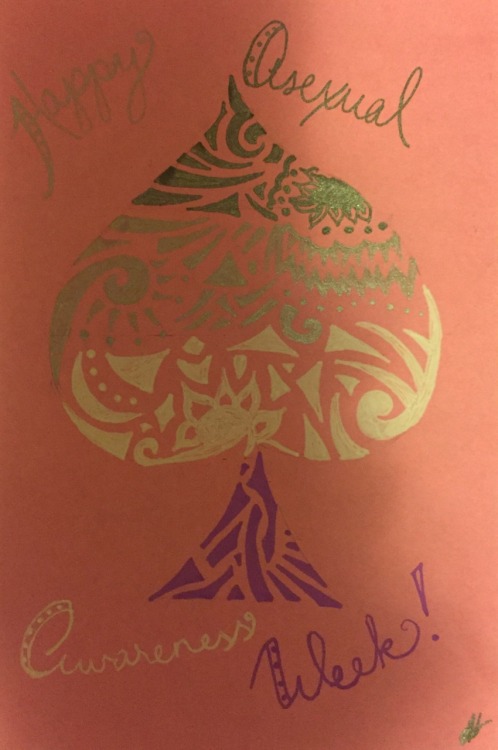#ace awareness week
WHERE ARE MY ASEXUAL MEN??!?!?!?
Where are my beautiful, precious, oppressed bois?
I can’t even begin to imagine what it’s like for you guys. Being seen as inherently hyper-sexual beings, just cuz “you’re men and that’s what all men are like/all men do”
That’s some load of BS
Whoever said that can go to the underground sauna
A-spec AMABs but not only: I see you.
You’re valid and appreciated and loved! A “man’s duty” is no longer based on what the ancient doctrines of patriarchy say. Honestly, fxck patriarchy.
Women are supposed to be prudes, men should always seek sexual contact blah-blah-blah
HOW ABOUT!!!! We let diversity spread and let people be who they want to be, do what they want to do with their lives? Eh?
It’s the last day of Ace Awareness Week! Below is a roundup of my posts in the past week, along with resources and sites that I’ve found particularly helpful.
- Asexual Visibility and Awareness
- Being an Ally
- Asexuality for Allosexuals
- Asexual/Allosexual Relationships
- My Story: Realization
- My Story: Acceptance
Resources
- Asexuality Archive
- Resources for Ace Survivors
- Asexual POC Resources
- Asexual Advice
- Asexual Awareness Week
- Asexual News – Draw from the Deck
- Asexual Visibility and Education Network (AVEN)
Blogs
- The Asexuality Blog
- The Asexual Agenda
- A life unexamined
- Concept Awesome
- The Thinking Asexual
- Everyday Ignorance
Articles
“You deserve someone who wants to have sex with you,” I tell him when we break up. “But I want you,” he replies. “I don’t want to compromise anymore,” I sigh. “But I love you,” he counters. “Yeah,” I say.
“We broke up because I really didn’t want to do…sex stuff…” I admit to my friend. “Oh,” he says, “but that’s expected in a relationship. The guy needs it.” “Yeah,” I say.
“Stick with me here, I’m going to use tumblr words”, I write to my friend. I tell him about “asexuality” and “aromanticism” and how they resonate with me. I type,
I’m kind of floundering on being like “Yes! I found my community!” vs worrying that I’ve compartmentalized and locked away something that’s integral to the human experience
Maybe you’ll experience sexual attraction one day, he tells me. “I wouldn’t self identify with tumblr folks…….” he writes, “you are not nearly as old as me.” “Yeah,” I say.
“I think I’m asexual,” I tell my friend. She’s skeptical. I spend the next half hour explaining the difference between romantic and sexual attraction. “I guess I kind of understand,” she finally says, “but maybe you just haven’t met the right person yet.” “Yeah,” I say.
“I…I’m kind of asexual,” I stammer out to the boy I like. He accepts it. He surprisingly knows about cake.
“I’m conflicted,” I later admit. “I still feel like sex is something that I should like, or that I’m missing out on something important – something part of the human experience.” “But what’s ‘the human experience’?” he asks. “Yeah,” I say.
My friend and I are talking about relationships. “I have a bit of a different view on relationships because I’m asexual,” I slip in. “Oh, cool,” he says, and the conversation continues as before. “Yeah,” I say.
“I hate compulsory sexuality,” I tell my friend as we rant about the things we dislike about society, “because it took me so long to realize that I’m asexual and be okay with not wanting to have sex.” “That’s really crappy. I never realized how pervasive it is, ” she commiserates. “Yeah,” I say.
I’m on the phone with my mom. “If you’ve read stuff on my blog, you know I talk about asexuality…because I’m asexual,” I tell her. I answer her questions about it. “Are you okay with it?” she asks. “What do you mean?” I say. She explains, “You know, sometimes when people are different, they feel bad about it and wish they could change. Are you okay with being asexual?” “Oh,” I say. “Yeah. Definitely.”
In the first grade, my teacher asked us all what we wanted to be when we grew up. I don’t remember what I answered – dancer, probably, or pianist. One girl replied, “A mom.” The teacher beamed. The girl beamed. The entire class was awash in admiration and jealousy that she had arrived at the “best” answer. I simmered in envy and confusion because I wouldn’t have thought of that answer given a million years.
At Chinese summer camp, there was one girl who I thought was the coolest. I was too shy to talk to her. In dance class, we had to line up in height order; I tried to make myself shorter so I would be next to her. She hated dance class so I pretended to hate it, too. I’m frowning in all of the pictures my parents took of the final camp performance.
My church had a youth group sex education retreat for teenagers. They taught abstinence until marriage. We did exercises where one of us would ask another in the circle, “Would you like to have sex with me?” and they would reply, “No, thanks.” I found it amusing. They didn’t teach us that sometimes people don’t ask nicely.
I wasn’t interested in relationships in high school. I never really talked about crushes with my friends or parents. One day, my mom told me that if I was gay, she still loved me. I appreciated it, but I told her that I was not. I had thought about it, and didn’t want to have sex with anyone of my same gender. I didn’t want to have sex with anyone at all. I supposed that meant I was straight.
My first relationship began in college. I had started hanging out with this guy more and more, and we had become good friends in a short amount of time. He asked me to be his girlfriend. I said yes because I thought having a boyfriend meant having a best friend of the opposite gender.
I first encountered the concept of asexuality while watching House. There was an asexual couple who came into the hospital, and House bet Wilson that he could find a medical reason why they weren’t having sex. He did. The man had a pituitary tumor. The woman wasn’t asexual, either. She had been pretending for her partner, and was glad at the prospect of sex. She said, “A girl has needs.” I thought that maybe I should try harder to get in touch with my “needs”.
We broke up over sex. Sex and traveling. I hate both.
I started taking an ASL class at work, and along with that came surprisingly personal questions like “Do you have a boyfriend/girlfriend? A husband/wife?”, “Do you want to get married in the future?”, and “Do you want children?” I had no idea how to answer those in English, let alone sign language.
I thought about my past relationship and how I was so relieved when it ended. I thought about the types of relationships I wanted to be in. I ended up googling things like “Is it okay to not want to have sex?” and “Is it wrong to not want sex?” I ended up relearning about asexuality. I was so confused by all the new terminology – I didn’t even know what “sexual attraction” meant or felt like.
I came across the three-part series, Possible Signs of Asexuality, and kept reading it over and over again because I couldn’t believe that other people felt the same way that I did. I devoured other aces’ stories online. They weren’t broken, so…I wasn’t broken? It took me a while to accept that.
The agony and ecstasy of mixed allo/ace romantic relationships (or rather, romantic relationships in general).
Sex Is Not Love
At least, not for most asexuals. And not for many allosexuals, either.
Not being sexually attracted to their partners doesn’t mean aces love them any less. Not wanting sexual intimacy doesn’t mean aces love their partners any less. Not wanting to have sex doesn’t mean aces can’t love.
Compromise?
Compromise is part of any relationship, romantic or otherwise. Maybe you listen through that song you dislike because it’s your best friend’s favorite. Maybe you do the laundry and your significant other does the dishes even though you both hate doing either, but you hate doing laundry slightly less. Maybe your partner watches a show they find boring with you because you find it endlessly amusing. In mixed relationships, sexual intimacy may be one of the biggest compromises.
Some asexuals choose to have sex. Some allosexuals choose not to have sex. In my opinion, the latter happens much too infrequently, mostly due to internalized compulsory sexuality and the notion that allosexuals need to have sex. Asexuals – especially sex-repulsed, sex-averse, and sex-indifferent aces – need to be honest about how much sexual intimacy they can give; allosexuals need to be honest about how much sexual intimacy they require.
When I talk about compromise, I’m talking about the definition that means “finding a happy medium”, with emphasis on the “happy” part. I don’t think some allosexual people realize how important it is for some aces not to have sex, and it’s hard for aces to admit because the notion that sex is enjoyable or required has been told to us again and again. As someone who vacillates between being sex-repulsed and sex-indifferent and who “compromised” in a previous relationship, it wasn’t even how terrible sex itself was for me – it’s how soul-crushing it was to have to smile and fake being “sexy” when my partner expected me to look like I was enjoying myself. That type of compromise isn’t what I’m advocating. It can be hard for allosexual people to admit how much they need sex, too, because there’s another notion that a good relationship requires sacrifice, and that breaking up over sex is petty. It’s not. Different people require different kinds of intimacy, and sexual intimacy is very important for some people. That’s not wrong or bad. The bottom line is, if you can’t reach a happy medium, it’s not a good compromise at all.
Communicate your needs honestly, and value yourself and your partner greater than the relationship itself. The end of a romantic relationship doesn’t mean that it was a failure. And if you decide to stay together and compromise on sexual intimacy, you need to make sure both you and your partner are happy and okay with the boundaries that are set.
Consent
Consent is really important to understand. Even if you’re in a romantic relationship, you don’t owe your partner sex and vice versa. Even if you come to a compromise where you and your partner are sexually intimate, you can always say no. They can always say no. And at that point, nothing should happen. Consent cannot be given in advance – consent must be asked for each time. Asexual people can give enthusiastic consent. Don’t settle for anything less.
Open Relationships and Polyamory
Sometimes an open relationship where each partner is free to explore other relationships works best. Sometimes one or both partners are polyamorous and are able to fulfill various needs and desires with their other partners. Often, it’s valuable for the allosexual to have their sexual needs met by someone else, which takes the pressure for sex off their asexual partner. Monogamous, romantic relationships are often seen as the be-all and end-all, but hey, why not buck compulsory monogamy while we’re bucking compulsory sexuality?
Resources
In my post yesterday on being an ally, I mentioned that it’s important for allies to educate themselves for the benefit of aces. Today I want to talk about how learning about asexuality and aromanticism also benefits allosexuals!
Asexuality prompts us to think about relationships outside cultural norms. Society tells us that sex and love are intertwined; romantic relationships can’t exist without sex. For people who don’t experience sexual attraction, though, sex and love are decoupled. And aromanticism undermines society’s relationship hierarchy even further. The notion of a “romantic ideal”, or one relationship that is held above all others, is questioned. Challenging the concept that sexual and romantic relationships should be valued more than all others can be liberating for asexual, allosexual, aromantic, and alloromantic people alike.
If we stop defining our significant relationships only as those that are romantic or sexual, being single will take on a whole new meaning. If we broaden our emotional focus from the person we share bodily fluids with to the sum of our friendships, acquaintances, and colleagues, our communities will grow stronger. If we stop treating penetrative sex as the be all and end all of physical intimacy, we will experience greater heights of pleasure. And if we can accept that although sex can be ecstatic and affirming and fulfilling, it is not all those things to all people all of the time, we will relieve it of some of its cultural baggage.
– Life Without Sex: The Third Phase of the Asexuality Movement
Asexuality and aromanticism also lead to questions about what sexual or romantic attraction is in the first place. The asexual community has a plethora of words to describe different types of attraction, relationships, and orientations. This terminology becomes a powerful tool in self-introspection that can be used by both asexual and allosexual people.
Attraction
What does sexual attraction feel like for you? What does romantic attraction feel like? Aesthetic attraction? Sensual, emotional, or intellectual attraction? For most people on the ace spectrum, it makes sense to differentiate between sexual and romantic attraction because they only feel one or none. For some allosexual people, sexual and romantic attraction don’t feel differentiable.
It’s useful to think about what types of attraction you feel because they often correlate with expectations of intimacy. If you feel like sexual and romantic intimacy are interconnected, a reduction in the sexual intimacy in a romantic relationship might make you feel like the romance itself has been reduced. Having the terminology to describe these feelings to your partner is important, especially when discussing differing expectations.
Relationships
For asexual and aromantic people, the standard script of romantic sex-based relationships that society presents doesn’t work – and why should it? We should be able to define what relationships we want in our own lives outside of prescribed norms. We can ask questions like: If sex isn’t what separates a friendship from a romantic relationship, what does? When does platonic love become romantic? When does a sensual or romantic touch become sexual? If romance isn’t important, what do committed, life-long relationships look like? What does a nonromantic, nonsexual, emotionally intimate relationship look like? How can I best communicate my needs in any relationship that I have? What boundaries do I want to set in my relationships? How physically intimate am I willing to be? How can I express how much I care about the other person in all of my relationships, sexual, romantic, platonic, or otherwise?
These questions shouldn’t just be asked within the ace community. As an allosexual person, what separates a friendship from a romantic relationship for you? Do you require sexual intimacy in romantic relationships? What types of relationships do you want in your life? Do you want them because they’re culturally prescribed, or because you desire a certain mix of intimacies?
Resources
Before we begin, check out Asexuality 101 andAromanticism 101 if you want a brief refresher.
Educate Yourself
As an allosexual person (someone who experiences sexual attraction), you might feel a wide range of emotions and thoughts when you learn about asexuality. You may feel like asexual people are “missing out” on something that you think is important. You may feel like asexual people have an easier time because they don’t have to deal with sexual attraction. You may feel like sexual orientation isn’t a big deal. You may be skeptical that asexuality is a valid orientation. Whatever you may think, work through your feelings in private. When an asexual person comes out to you, it isn’t the time to air out all of your feelings and thoughts about asexuality. Educate yourself on asexuality so that you already know the answers to basic questions; it’s a rare and delightful experience when an asexual person comes out to someone who already knows what asexuality is.
Just like coming out with any other orientation, the person is telling you because they trust you, and being ace is a part of their identity that they want you to know about. Support them by affirming their identity and appreciating that your relationship is now a space where they can be a more whole version of their self. If you have lingering questions about asexuality or are curious as to what their experience is like, ask individualized questions like “What does it mean to you?” to avoid having them speak for the entire asexual community.
Don’t assume that they’re unhappy at being asexual – often, learning about asexuality and identifying as ace is liberating. If you’re concerned that they’re uncomfortable with their sexual orientation, you can always ask them how they feel about it. Ask supportive clarifying questions like “How did you feel when you first found out about asexuality?” or “How do you feel now that you identify on the ace spectrum?” Most of the time, though, coming out is just a way for someone to be more true to themselves. They’re not looking for advice, help, or validation – they’re looking for you to listen and understand.
The same advice applies for aromanticism. Something to keep in mind when discussing asexuality is aromantic erasure, especially because people often (wrongly) accept asexuality as an orientation as long as the asexual person is also alloromantic.
Call Out Ace and Aro Erasure
Our society has a pervasive notion that everyone needs sex or romance to be happy. The assumption that everyone is allosexual and should want to have sex is called compulsory sexuality. The assumption that everyone is alloromantic and should want to have romantic relationships is called amatonormativity.
Call out these assumptions when you can. Challenge when someone says that everyone needs sex. Challenge when someone says that all single people are lonely. Include asexuality in discussions about sexual orientation. Call out when asexuality or aromanticism is mocked or invalidated. Celebrate forms of nonsexual or nonromantic intimacy. You don’t have to go out of your way to do these things – prevent the spread of misinformation whenever you can, just like you would call out other hurtful or hateful remarks.
Talk About It
If you work in sex education, it’s important to emphasize that asexuality is a valid sexual orientation and that it’s okay to not want to have sex. Examine your teaching material for ace erasure and give your students the terminology available to express their feelings about sexual attraction, romantic attraction, and other aspects of their identity (I recommend the genderbread person).
Sometimes asexuality or aromanticism comes up in personal discussions with close friends. If someone tells you about intimacy or relationship trouble that they’re having, it’s never appropriate to dismiss their feelings or recommend ways to fix the problem (unless they specifically ask for help). Listen and support them. If it sounds like their feelings and experiences are similar to those of other asexual or aromantic people, bring it up. It’s important not to “diagnose” someone, but mentioning that asexuality and aromanticism are valid orientations not only demonstrates ally-ship, it can open a world of possibilities if the person has never heard of them before. It’s also important to say affirming statements like “It’s totally fine to not want to have sex”, “It’s okay to not want a person in that way”, and “You don’t owe anyone intimacy”.
Instead of saying, “Asexuality doesn’t exist,” try saying, “Asexuality is a sexual orientation just like bi, gay, lesbian, and pan.”
Instead of saying, “You will know when it’s time to have sex,” try saying, “Love doesn’t equal sex.”
Instead of saying, “Have you seen a doctor?” try saying, “There are many happy, healthy relationships that don’t have sex involved in them.”
Instead of saying, “This will pass, it is just a phase. Everyone wants sex sometimes,” try saying, “Sexuality is fluid and exists on a huge spectrum. There are many different types of sexuality.”
Instead of saying, “Sex is a natural part of adult relationships,” try saying, “Sex and sexuality are complicated to figure out. Give yourself time and space to explore what you are feeling.”
– Asexuality 101: Asexual Awareness Week Community Engagement Series
Note that behavior is different from orientation, and while asexual people don’t experience sexual attraction, some aces choose to have sex for other reasons (pleasure, physical intimacy, making their partner happy, etc. – the same reasons that allosexual people have sex outside of attraction). The important thing is that their ace identity allows them to freely make that choice, rather than it being forced on them through compulsory sexuality.
Resources
Ace Awareness Week is October 19-25 this year!
What is asexuality?
Asexuality is a sexual orientation. Other sexual orientations – heterosexuality, homosexuality, bisexuality, pansexuality, etc. – are characterized by sexual attraction toward various gender identities. Asexuality is the lack of sexual attraction. Just like sexuality is a spectrum, asexuality is a spectrum as well.
Asexuality is different from celibacy and abstinence – behavior doesn’t define an orientation. It’s different from reduced libido or sex drive – attraction is different from arousal. It isn’t indicative of an underlying medical or mental condition. The lack of sexual attraction isn’t related to a lack of romantic attraction, either. Everyone, asexual or allosexual, has a romantic orientation – they can be panromantic, homoromantic, aromantic, biromantic, heteromantic, etc. For most allosexuals, their sexual and romantic orientations align.
Why Asexual Visibility and Awareness Is Important
Asexuality isn’t as well known as other sexual orientations, which is why awareness, education, and visibility is important! When statements like “everyone wants sex”, “sexuality is healthy”, and “a relationship without sex is just friendship” are made, asexuals are marginalized and erased. The default assumption is that everyone experiences sexual attraction and that everyone wants to have sex. This makes many asexuals feel alienated and broken, especially when they haven’t heard of asexuality or have only heard “asexual” used in a derogatory manner.
Awareness of asexuality is important so that people are equipped with the knowledge and tools necessary to discover their orientation and make informed decisions about whether or not they want to have sex. It’s important for people to know that their feelings toward sex and intimacy are valid and not something that needs to be fixed. It’s important for people to know that they’re not alone.
Resources
Sometimes I feel lime we should alter the definition of asexuality to be as inclusive but still more easily understood as an orientation and as a spectrum. “Lack of sexual attraction” isn’t wrong, but I feel “Lack of (sexual) attraction to gender or in general” is much better. It still says the same thing but more obviously for those who struggle to grasp the concept. Also the “sexual” part there is like that because it also makes the “sexual” part of the attraction an optional addition and acknowledges that Asexuality is an orientation beyond the split attraction model.
Tbh looking back I realize the earliest I realized I was asexual was probably when I was 8 and other kids started talking about having crushes and who liked who and I just… Never felt it. And tbh the fact that I would probably saved myself from misidentifying as a lesbian, a bi/pan person had I even known it was an option strikes me pretty hard.
Like. I wouldn’t have believed lesbians telling me not liking men meant I must like girls instead at 13. It would have saved me the trouble.
I would likely not have called myself bi or pan because I felt the same way towards everyone like my aunt and her friends told me they were at 15.
It’s wild how knowing something like that would have possibly changed my entire experience as a queer teen growing up.




Onyx- protection and fortune.
Silver- wealth; unconditional love, hope, kindness, tenderness.
White Calcite- new beginnings.
Amethyst- serenity, understanding, trust and grace.
I made a new comic for Ace Awareness Week 2017!
This one addresses some of the assumptions people have made about me because I’m ace. Hopefully this will help spread some awareness of what asexuality is and is not. :)
Here are some other ace comics I’ve made:
- Cake Walk (my questioning/coming out story)
- You’re Doing it Wrong (special for Ace Awareness Week 2016)
If you have any questions about ace stuff, feel free to hit up my ask box!
Post link
Bitches keep falling in love with me cause I’m a confused aroace. Like bro I don’t even speak love language just listen to this damn song with me

